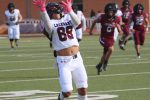Council continues to consider ‘golf carts’
By LPR Staff
Editor/POST-REGISTER
Although some details remain to be hammered out, the City of Lockhart is closer this week to putting rules in place to allow the use of “neighborhood electric vehicles” on residential, low-speed streets.
The progressive initiative, introduced last month by District 3 Councilmember Lew White, garnered regional and nat
ional attention in early July, catapulting Lockhart into the spotlight as one of the most forward-thinking communities in the State.
The proposed ordinance presented to the council on Tuesday evening by Lockhart Police Chief Mike Lummus spells out in detail the streets upon which the “neighborhood electric vehicles” can be used, and the registration and equipment requirements owners must fulfill to use the vehicles.
Using state statutes as a platform, Lummus and City Attorney Peter Gruning drafted the ordinance, which still requires some fine tuning to be effective.
“We have some interest from the outlying neighborhoods like Summerside and Twin Island, and we need to see if there isn’t a way to make sure those people can take advantage of these vehicles, if they want to,” White said.
Under the ordinance as it was originally proposed, the vehicles cannot be used on roads with speed limits over 35 miles per hour, with the specific intent of keeping them off Highway 183, Highway 142 and FM 20 East and West. While the vehicles can be driven across those roads, they should not be driven on them.
White suggested the limitations might defeat the purpose of the initiative, or at least limit its effectiveness.
“One of the main ideas here is to allow people to use these neighborhood vehicles to run their errands,” he said. “We’re going to limit that if they don’t have a way to get out to Wal-Mart.”
White also addressed the use of personalized motor scooters, which are often seen on Highway 183 as their riders attempt to run errands at Wal-Mart.
The ordinance also fell short in terms of insurance, which concerned Mayor James “Jimmy” Bertram.
“We need to have something in there about insurance requirements,” Bertram said. “What we don’t want to see is someone driving one of these neighborhood vehicles and getting in an accident and doing damage, not only to the driver and a regular vehicle, but to the neighborhood vehicle, through some negligence of the driver of the electric car.”
After much discussion, the council decided to table the initiative to allow Gruning and Lummus time to work out these details.
Some citizens, including White and District 4 Councilmember Richard Banks, have already begun to use neighborhood electric vehicles. However, Lummus and the council want to make clear that these vehicles are not “golf carts,” and that standard golf carts are not legal for use on city streets.
Unlike a regular golf cart, neighborhood electric vehicles are required to have headlamps and taillights, seat belts and windshields. They must be registered with the State of Texas, just like any other vehicle, and are subject to inspection. Though standard golf carts may be retrofit to meet these requirements, drivers without these adjustments may be ticketed for driving on city streets.
In other business, the council addressed the concerns of a Trinity Street neighborhood before allowing a zoning change that may change the face of that area.
Last month, a developer came forward to request that a parcel of property off Trinity and Ruddy Streets be rezoned for Residential High Density, in hopes he can build a series of fourplexes on Trinity and Teal Streets. The idea garnered vocal concern from the neighborhood – concerns which were repeated during a public hearing on Tuesday.
“I appreciate that the city has addressed and is looking into the problems with drainage,” said Shannon Kloesel, a resident of the area whose yard and home flooded during a weather event in 2007 when around 10 inches of rain fell in three hours. “And I understand that if we have an event like that again, it might flood again. What I’m also worried about is the traffic, about people congregating on Teal Street if it’s turned into a cul de sac, and, really, what these things are going to look like.”
Kloesel’s home is on the corner of Trinity and the presently-unpaved Teal Streets, and will be adjacent to the fourplexes, if they are built.
Though the council suggested the developer meet with the neighborhood and discuss his plans, the meeting never took place. The developer claimed he could not share plans with the neighbors because his plans hinged on whether the property was rezoned.
Ultimately, the council agreed to grant the rezoning, allowing the project to move forward.
The council also heard an appeal from a property owner asking for a variance to allow a small-engine repair shop to be opened in the Downtown Historic District, in the 100 Block of Commerce Street.
The Planning and Zoning Commission denied the variance, but the property owner decided to bring the issue before the council because small-engine repair is not specifically addressed in any zoning ordinance.
After hearing the concerns of the property owner, which include the fact that a similar business was located in the area fewer than five years ago, the council voted 6 -1 to change the current zoning ordinance to address small-engine repair on a “specific use” basis, which will allow the property owner to revisit the issue with the Planning and Zoning Commission. Banks voted against the proposal, suggesting he did not want to allow such a business anywhere within the downtown district.
The Council discussed moving National Night Out from its normally-scheduled time in August to Oct. 7, 2008, following a change at the state level allowing Texas to celebrate National Night Out later in the year. Watch future editions of the Lockhart Post-Register for more information about National Night Out activities.
The Lockhart City Council meets on the first and third Tuesday of each month at 7:30 p.m. in the Glosserman Room at Lockhart City Hall.


